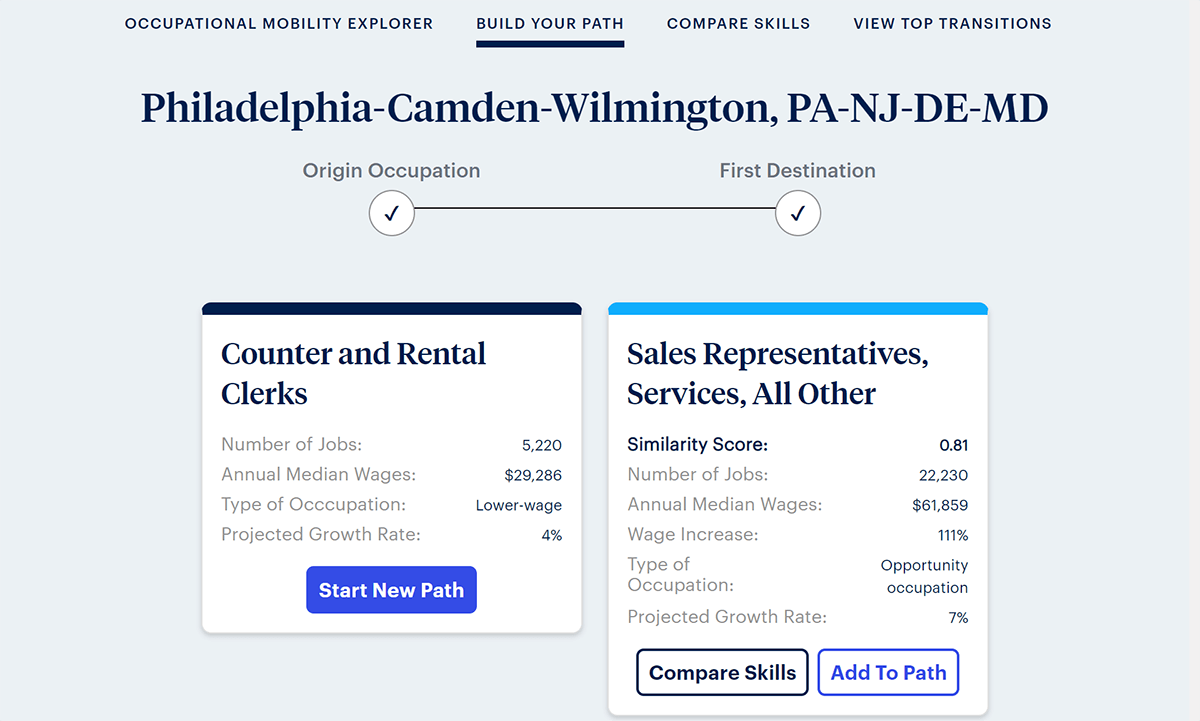Today’s career paths are rarely linear. Mine looks more like a rock climbing wall than a ladder. But no matter where I gained skills along my career journey, I’ve found surprising ways to apply them.
After moving to Washington, D.C. to begin a new job in public policy I soon learned that I would need a second job to make ends meet. So, I picked up several shifts each week at a local fitness studio. While staffing the front desk I checked in guests, set up heart-rate monitors, and followed up with leads to sell memberships.
I still use those customer service skills developed during early mornings at the gym. They contribute to my success as a member of the outreach team in the Philadelphia Fed’s Community Development and Regional Outreach department. I hold one-on-one meetings, host small group discussions, and plan large events. The skills I developed working the front desk also apply to my work calling community leaders, persistently emailing stakeholders about new policy developments, and ensuring that all of our event attendees have a positive experience.
Find your own transferable skills and a higher paycheck
Skills you learn on the job, such as communications and customer service, easily transfer to other fields. The new Occupational Mobility Explorer tool developed by the Philadelphia and Cleveland Feds highlights these transferable skills and gives you the ability to explore higher-paying jobs within your community. The tool is designed to help low-wage workers transition up to higher-wage jobs without needing a four-year degree.
How to explore your occupational mobility
How can the Occupational Mobility Explorer tool help illuminate paths to higher wage positions? Let’s use counter and rental clerks as an example. These jobs are considered low-wage in the Philadelphia region. According to the tool, the annual median wage in this market for this position is $29,286. The Occupational Mobility Explorer shows that the skills demanded for these workers are also necessary for sales representatives, whose annual median wage is $61,859. This career transition does not require a 4-year degree, and could result in an 111 percent pay increase.
You can use the information provided by the tool in a variety of ways. How? Create a path to occupations that demand similar skills. Explore which skills are most in demand in a given area. You can also analyze information on almost 4,100 pairs of jobs that require similar skillsets.
Opportunity Mobility Explorer
Build your path to identify careers in your area that require many skills similar to your own.
If you lost your job during the COVID-19 pandemic, use the tool to learn about the kinds of jobs that rely on many of the skills you already have. For a more in-depth examination of how this tool can help workers who lost their job during the pandemic, visit the Philadelphia Fed’s report examining career transitions caused by COVID-19 in the Philadelphia region.
Bringing the Opportunity Mobility Explorer into communities
The creators of the Occupational Mobility Explorer hope that it can be a conversation starter. For example, high school guidance counselors, parents, and leaders of job training programs have used this tool to discuss career paths and identify skill development opportunities with their students, children, and clients. Community colleges have also considered how this tool can help them train students for in-demand jobs.
Try the tool for yourself! Choose your current job and see what other jobs demand the skills you have. You may find that you already have many of the skills needed for a higher-paying career. You might find that the career switch you’ve been thinking about is in your grasp. And like me, you may be pleasantly surprised at how a job from your past may set you up for future success in an entirely different field.








